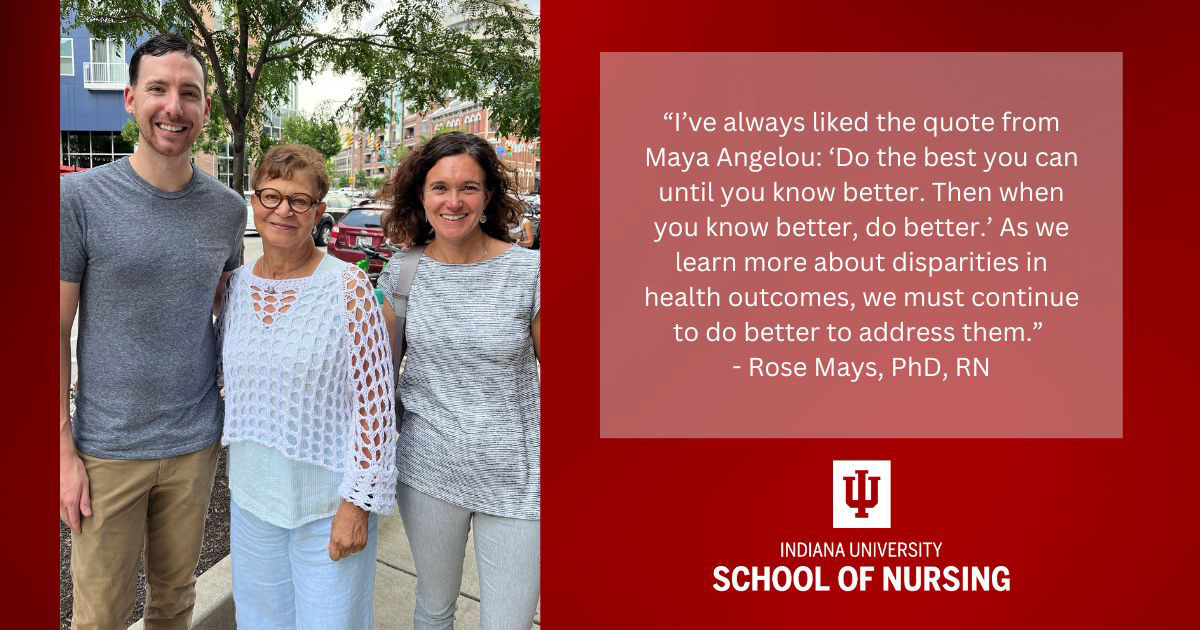Health disparities within minority populations weren’t widely discussed in the early days of Rose Mays’ nursing career. But as a school nurse in a predominantly Black neighborhood on Indianapolis’ near east side, she witnessed firsthand the consequences of health care inequality.
“I saw kids who weren’t getting their vaccinations or going in for checkups, primarily because their families couldn’t afford it,” said Mays, PhD, RN, who spent five years in public health nursing before pursuing graduate education. “As a school nurse, I became sort of the default for that kind of primary care for kids—and I really had a heart for that community.”
Throughout Dr. Mays’ career, her heart—and her commitment—remained with fostering health equity for children and adolescents. After graduating from IU School of Nursing (IUSON) with a master’s degree in 1974, she began teaching pediatric nursing in the nurse practitioner program at IUSON. During her 36 years on the school’s faculty, Dr. Mays led a robust research and community service program focused on health promotion and disease prevention for adolescents. She earned funding support for her projects from public and private organizations, including the National Institutes of Health, the Robert Wood Johnson Foundation, the Lilly Endowment, Pfizer Foundation, Merck & Company, and the Indiana Department of Health.
Dr. Mays’ interest in diversity and health equity was fueled by two groundbreaking reports—the first of which was released while she was completing her doctorate in nursing at the University of Texas. The “Report of the Secretary’s Task Force on Black & Minority Health,” released in 1985 and directed by then U.S. Health and Human Services Secretary Margaret Heckler, was one of the first reports to document health disparities among Black people and minority populations.
“That report really hit home for me; this is not only a problem Rose Mays has seen, it’s a problem for our entire country,” Dr. Mays said.
Released in 2003, a second report, the Institute of Medicine’s “Unequal Treatment: Confronting Racial and Ethnic Disparities in Health Care,” analyzed the reasons for disparities in health outcomes, suggesting that the health care delivery system was partly to blame.
“The report got me to thinking about what we can do as nurses and practitioners in the exam room with our patients to help address some of these disparities,” Dr. Mays said. “And then my focus turned to nursing education and how to help young nurses better understand the social conditions that influence negative health outcomes and how they can contribute to alleviating the problem.”
With the firm belief that nurses have the power to help mitigate health disparities, Dr. Mays and her husband, the late William G. Mays, established the Rose M. Mays Excellence in Teaching Diversity Fund at IU School of Nursing in 2001. The fund provides support for IUSON faculty in developing diversity-related curricula. Fourteen IUSON faculty members have received support from this fund.
While Dr. Mays believes the nursing profession has made great strides in addressing health disparities through curriculum guidelines and health equity-related competencies for nursing students, she said there will always be room for improvement.
“I’ve always liked the quote from Maya Angelou: ‘Do the best you can until you know better. Then when you know better, do better,’” she said. “As we learn more about disparities in health outcomes, we must continue to do better to address them.”
Editor’s note: Dr. Mays is professor emerita at IU School of Nursing. She served for eight years as the school’s associate dean for community and international affairs. In this role, she was responsible for overseeing IUSON’s community service and international projects and arranging for more than 2,800 undergraduate student clinical placements each year. Among her numerous awards and honors, Dr. Mays was elected to the American Academy of Nursing in 2003 and received the Sagamore of the Wabash from Indiana Governor Mitch Daniels in 2009.
RELATED STORY:Bryan White and Marian Gilhooly lead in developing cultural competencies for the nursing curriculum


